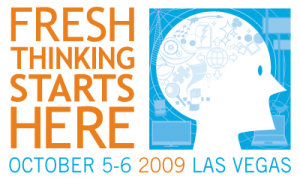fresh thinking from brand managecamp
Earlier this week I attended one of the best conferences I’ve ever been to – Brand Managecamp. Billed as the “elite conference on branding,” and featuring some heavy hitting speakers like guru Guy Kawasaki and marketing professor/legend Phil Kotler, I had quite high expectations going into it – and they definitely were met. Len Herstein and his team did a fantastic job of assembling the perfect mix of speakers and topics to educate, inspire, and in some cases, provoke the assembly of high caliber attendees.
Billed as the “elite conference on branding,” and featuring some heavy hitting speakers like guru Guy Kawasaki and marketing professor/legend Phil Kotler, I had quite high expectations going into it – and they definitely were met. Len Herstein and his team did a fantastic job of assembling the perfect mix of speakers and topics to educate, inspire, and in some cases, provoke the assembly of high caliber attendees.
I had wanted to attend this conference because unlike many others out there these days, it didn’t focus exclusively on social media or new technologies. While these topics are important, I believe they are best understood and developed in the broader context of brand and business strategy. By including talks like “The Brand Bubble: The Looming Crisis in Brand Value and How to Avoid It” and “An Innovative Kick in the Pants: Unlocking Innovation for You and Your Brands,” as well as “Groundswell: Winning in a World Transformed by Social Technologies,” the conference presented a balanced and broad view of today’s brand challenges and opportunities.
Some common themes emerged from across the day and a half of presentations: Innovation. Substance. Results. Today, I’ll pass along some of the notes I took on the first: Innovation.
The recession has caused practically all businesses to cut back R&D and to avoid taking risks with new product introductions. But many leaders are now returning their attention back to growth and there’s a clear innovation mandate for those who want to lead the recovery. Many of the speakers talked about the need to ignite innovation – and they provided recommendations for how to do so.
Guy Kawasaki applied his entrepreneur and V.C. experience to suggest 10 rules for intra-preneurship. A couple of highlights:
- Lower barriers to adoption – follow the general principle, “don’t ask people to do something you wouldn’t.” And flatten the learning curve – one way to do this: embrace your evangelists. Your early adopter customers are the best folks to let others know about you and to get them to try your new product.
- Seed the clouds (aka make it rain) – push to stimulate sales quickly – instead of trying to win over skeptics or luddites, ask people who are already buying why they are and what would get them to buy more – and enable people to test drive your product easily.
Phil Kotler offered up a budget allocation recommendation to support innovation:
- 80% — manage the present – cut the fat, optimize opportunities, and right size your organization and activities
- 15% — selectively forget the past – cut your losses on things that aren’t working and move them into new opportunities
- 5% — create the future – develop new strategic intent
Simon Bray, head of capability for ?What If! (“the world’s largest independent innovation company”) took the audience through an interactive workshop on innovation. Some great points:
- Creativity = the habit of continually doing things in new ways to make a positive difference to our working lives. The emphasis is on “habit” because Creativity should be something that everybody in business does all the time. And just like anything new, it might feel strange at first – but with practice it becomes easier.
- Innovation = Insight + Ideas + Impact (i.e., which ideas have the most potential) — creativity is needed in all three — insight means that the first thing to do is immerse yourself in the issue and use that understanding to identify new directions
Simon reminded us that kids live in a world of possibility – slowly we lose that perspective. We must get back to expansionist thinking.
- Six Behaviors to Unlock Creativity:
- Greenhousing – take new ideas and deliberately explore them without judging them – apply “S.U.N.” behavior – Suspend (judgment), Understand, and Nurture
- Signaling – make it clear when to greenhouse and when to judge
- Freshness – deliberately expose yourself to new ideas and perspectives
- Realness – do rapid prototyping – bring the ideas to life in ways other than words since words can be so limiting
- Momentum – do things fast; create a crisis if necessary
- Bravery – take risks and reward acts of bravery in others
The best quote of the day on Innovation came from Jeremy Gutsche, Founder of Trendhunter.com (the “world’s largest network for trend-spotting and innovation):
There’s no point in innovating if you think you already know the answer.
In my next posts, I’ll cover the key points about the other two themes: Substance (meaning, mission, authenticity, reality) and Results (ROI, accountability, behavior). Also I’ll share actual soundbites from the speakers in upcoming podcasts. Stay tuned…